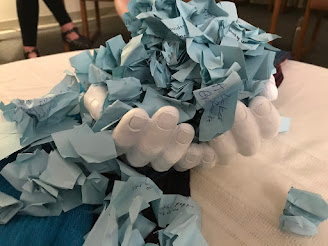Ann, a longtime friend -- and dialogue colleague -- was born with poor hearing. To understand others and to survive in this hearing world, she learned to lip read. She was so excited when she became eligible for a cochlear implant. Her recent surgery was a success! But now comes the hard work!
Ann must unlearn skills that have aided her throughout her life. Friends now come to her home to read to her. She listens to each word or sentence and repeats back what she hears. She is rewiring her brain to focus on a physical attribute that could not be relied on in the past.
And, she must unlearn her lip reading skills.
 |
| What skills do you use to understand others? (Photo credit: GAN Networking Can Do Lip Reading and Output Speech, NeuroHive) |
As I listened to Ann describe her joys of hearing -- and the frustrations of unlearning, I wondered:
- What skills have I learned to compensate for losses in my life?
- How do I survive in a world dominated by truths -- or untruths -- that I don't understand?
- Do I hear clearly what others are saying?
 |
| Are there lessons that need to be unlearned? (Photo credit: You Must Unlearn What You Have Learned, Marco Giberti) |
Think about how you learned to communicate. For most of us, it was mimicry: imitating family and friends around us. Now, think of the assumptions that we may have accepted along the way: the people we loved and emulated figured out how to survive in this world... and Must be Right in what they said or did.
 |
| Are you willing to become curious about others -- and unlearn untruths? (Photo credit: Why Unlearning Matters? How to Unlearn?, Social Science Space) |
Ann mentioned that she has a short window to unlearn and relearn -- retraining her brain. She can now hear clearly the crispness of the S, and she is finding that her own verbal skills are improving as she talks. She reminisced about her long-trusted friend, Lip Reading... and what it means for her to let go. Now the hard work of unlearning and relearning!
May we find reasons this week to unlearn poor listening skills. May we seek ways to hear more clearly. May we be willing to relearn what it means to understand.










